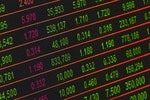
Will GoodRX Stock Bounce Back?
GoodRX (NASDAQ:GDRX) tracks prescription drug prices and its model was…


| Company | Revenue Forecast | Earnings Forecast | Revenue Growth Forecast | Earnings Growth Forecast | Analyst Price Target Median |
|---|---|---|---|---|---|
|
EWD
iShares MSCI Sweden ETF
|
-- | -- | -- | -- | -- |
|
EIS
iShares MSCI Israel ETF
|
-- | -- | -- | -- | -- |
|
EWG
iShares MSCI Germany ETF
|
-- | -- | -- | -- | -- |
|
EWL
iShares MSCI Switzerland ETF
|
-- | -- | -- | -- | -- |
|
EWO
iShares MSCI Austria ETF
|
-- | -- | -- | -- | -- |
|
EWQ
iShares MSCI France ETF
|
-- | -- | -- | -- | -- |
| Company | Price | Analyst Target | Market Cap | P/E Ratio | Dividend per Share | Dividend Yield | Price / LTM Sales |
|---|---|---|---|---|---|---|---|
|
EWD
iShares MSCI Sweden ETF
|
$44.63 | -- | -- | -- | $1.01 | 2.26% | -- |
|
EIS
iShares MSCI Israel ETF
|
$93.97 | -- | -- | -- | $0.49 | 1.11% | -- |
|
EWG
iShares MSCI Germany ETF
|
$42.18 | -- | -- | -- | $0.68 | 1.61% | -- |
|
EWL
iShares MSCI Switzerland ETF
|
$54.55 | -- | -- | -- | $1.02 | 1.88% | -- |
|
EWO
iShares MSCI Austria ETF
|
$29.48 | -- | -- | -- | $0.85 | 4.83% | -- |
|
EWQ
iShares MSCI France ETF
|
$42.74 | -- | -- | -- | $0.95 | 2.87% | -- |
| Company | Total Debt / Total Capital | Beta | Debt to Equity | Quick Ratio |
|---|---|---|---|---|
|
EWD
iShares MSCI Sweden ETF
|
-- | 1.519 | -- | -- |
|
EIS
iShares MSCI Israel ETF
|
-- | 0.632 | -- | -- |
|
EWG
iShares MSCI Germany ETF
|
-- | 1.167 | -- | -- |
|
EWL
iShares MSCI Switzerland ETF
|
-- | 1.151 | -- | -- |
|
EWO
iShares MSCI Austria ETF
|
-- | 1.063 | -- | -- |
|
EWQ
iShares MSCI France ETF
|
-- | 1.136 | -- | -- |
| Company | Gross Profit | Operating Income | Return on Invested Capital | Return on Common Equity | EBIT Margin | Free Cash Flow |
|---|---|---|---|---|---|---|
|
EWD
iShares MSCI Sweden ETF
|
-- | -- | -- | -- | -- | -- |
|
EIS
iShares MSCI Israel ETF
|
-- | -- | -- | -- | -- | -- |
|
EWG
iShares MSCI Germany ETF
|
-- | -- | -- | -- | -- | -- |
|
EWL
iShares MSCI Switzerland ETF
|
-- | -- | -- | -- | -- | -- |
|
EWO
iShares MSCI Austria ETF
|
-- | -- | -- | -- | -- | -- |
|
EWQ
iShares MSCI France ETF
|
-- | -- | -- | -- | -- | -- |
iShares MSCI Israel ETF has a net margin of -- compared to iShares MSCI Sweden ETF's net margin of --. iShares MSCI Sweden ETF's return on equity of -- beat iShares MSCI Israel ETF's return on equity of --.
| Company | Gross Margin | Earnings Per Share | Invested Capital |
|---|---|---|---|
|
EWD
iShares MSCI Sweden ETF
|
-- | -- | -- |
|
EIS
iShares MSCI Israel ETF
|
-- | -- | -- |
iShares MSCI Sweden ETF has a consensus price target of --, signalling downside risk potential of --. On the other hand iShares MSCI Israel ETF has an analysts' consensus of -- which suggests that it could fall by --. Given that iShares MSCI Sweden ETF has higher upside potential than iShares MSCI Israel ETF, analysts believe iShares MSCI Sweden ETF is more attractive than iShares MSCI Israel ETF.
| Company | Buy Ratings | Hold Ratings | Sell Ratings |
|---|---|---|---|
|
EWD
iShares MSCI Sweden ETF
|
0 | 0 | 0 |
|
EIS
iShares MSCI Israel ETF
|
0 | 0 | 0 |
iShares MSCI Sweden ETF has a beta of 1.345, which suggesting that the stock is 34.489% more volatile than S&P 500. In comparison iShares MSCI Israel ETF has a beta of 1.000, suggesting its more volatile than the S&P 500 by 0.018000000000007%.
iShares MSCI Sweden ETF has a quarterly dividend of $1.01 per share corresponding to a yield of 2.26%. iShares MSCI Israel ETF offers a yield of 1.11% to investors and pays a quarterly dividend of $0.49 per share. iShares MSCI Sweden ETF pays -- of its earnings as a dividend. iShares MSCI Israel ETF pays out -- of its earnings as a dividend.
iShares MSCI Sweden ETF quarterly revenues are --, which are smaller than iShares MSCI Israel ETF quarterly revenues of --. iShares MSCI Sweden ETF's net income of -- is lower than iShares MSCI Israel ETF's net income of --. Notably, iShares MSCI Sweden ETF's price-to-earnings ratio is -- while iShares MSCI Israel ETF's PE ratio is --. Generally a lower price-to-earnings ratio signals a stock is trading at a lower multiple of earnings and is a better value. Another key metric is the price-to-sales ratio, which for iShares MSCI Sweden ETF is -- versus -- for iShares MSCI Israel ETF. Usually stocks with elevated PS ratios are considered overvalued.
| Company | Price/Sales Ratio | Price/Earnings Ratio | Quarterly Revenue | Quarterly Net Income |
|---|---|---|---|---|
|
EWD
iShares MSCI Sweden ETF
|
-- | -- | -- | -- |
|
EIS
iShares MSCI Israel ETF
|
-- | -- | -- | -- |
iShares MSCI Germany ETF has a net margin of -- compared to iShares MSCI Sweden ETF's net margin of --. iShares MSCI Sweden ETF's return on equity of -- beat iShares MSCI Germany ETF's return on equity of --.
| Company | Gross Margin | Earnings Per Share | Invested Capital |
|---|---|---|---|
|
EWD
iShares MSCI Sweden ETF
|
-- | -- | -- |
|
EWG
iShares MSCI Germany ETF
|
-- | -- | -- |
iShares MSCI Sweden ETF has a consensus price target of --, signalling downside risk potential of --. On the other hand iShares MSCI Germany ETF has an analysts' consensus of -- which suggests that it could fall by --. Given that iShares MSCI Sweden ETF has higher upside potential than iShares MSCI Germany ETF, analysts believe iShares MSCI Sweden ETF is more attractive than iShares MSCI Germany ETF.
| Company | Buy Ratings | Hold Ratings | Sell Ratings |
|---|---|---|---|
|
EWD
iShares MSCI Sweden ETF
|
0 | 0 | 0 |
|
EWG
iShares MSCI Germany ETF
|
0 | 0 | 0 |
iShares MSCI Sweden ETF has a beta of 1.345, which suggesting that the stock is 34.489% more volatile than S&P 500. In comparison iShares MSCI Germany ETF has a beta of 1.325, suggesting its more volatile than the S&P 500 by 32.452%.
iShares MSCI Sweden ETF has a quarterly dividend of $1.01 per share corresponding to a yield of 2.26%. iShares MSCI Germany ETF offers a yield of 1.61% to investors and pays a quarterly dividend of $0.68 per share. iShares MSCI Sweden ETF pays -- of its earnings as a dividend. iShares MSCI Germany ETF pays out -- of its earnings as a dividend.
iShares MSCI Sweden ETF quarterly revenues are --, which are smaller than iShares MSCI Germany ETF quarterly revenues of --. iShares MSCI Sweden ETF's net income of -- is lower than iShares MSCI Germany ETF's net income of --. Notably, iShares MSCI Sweden ETF's price-to-earnings ratio is -- while iShares MSCI Germany ETF's PE ratio is --. Generally a lower price-to-earnings ratio signals a stock is trading at a lower multiple of earnings and is a better value. Another key metric is the price-to-sales ratio, which for iShares MSCI Sweden ETF is -- versus -- for iShares MSCI Germany ETF. Usually stocks with elevated PS ratios are considered overvalued.
| Company | Price/Sales Ratio | Price/Earnings Ratio | Quarterly Revenue | Quarterly Net Income |
|---|---|---|---|---|
|
EWD
iShares MSCI Sweden ETF
|
-- | -- | -- | -- |
|
EWG
iShares MSCI Germany ETF
|
-- | -- | -- | -- |
iShares MSCI Switzerland ETF has a net margin of -- compared to iShares MSCI Sweden ETF's net margin of --. iShares MSCI Sweden ETF's return on equity of -- beat iShares MSCI Switzerland ETF's return on equity of --.
| Company | Gross Margin | Earnings Per Share | Invested Capital |
|---|---|---|---|
|
EWD
iShares MSCI Sweden ETF
|
-- | -- | -- |
|
EWL
iShares MSCI Switzerland ETF
|
-- | -- | -- |
iShares MSCI Sweden ETF has a consensus price target of --, signalling downside risk potential of --. On the other hand iShares MSCI Switzerland ETF has an analysts' consensus of -- which suggests that it could fall by --. Given that iShares MSCI Sweden ETF has higher upside potential than iShares MSCI Switzerland ETF, analysts believe iShares MSCI Sweden ETF is more attractive than iShares MSCI Switzerland ETF.
| Company | Buy Ratings | Hold Ratings | Sell Ratings |
|---|---|---|---|
|
EWD
iShares MSCI Sweden ETF
|
0 | 0 | 0 |
|
EWL
iShares MSCI Switzerland ETF
|
0 | 0 | 0 |
iShares MSCI Sweden ETF has a beta of 1.345, which suggesting that the stock is 34.489% more volatile than S&P 500. In comparison iShares MSCI Switzerland ETF has a beta of 0.949, suggesting its less volatile than the S&P 500 by 5.093%.
iShares MSCI Sweden ETF has a quarterly dividend of $1.01 per share corresponding to a yield of 2.26%. iShares MSCI Switzerland ETF offers a yield of 1.88% to investors and pays a quarterly dividend of $1.02 per share. iShares MSCI Sweden ETF pays -- of its earnings as a dividend. iShares MSCI Switzerland ETF pays out -- of its earnings as a dividend.
iShares MSCI Sweden ETF quarterly revenues are --, which are smaller than iShares MSCI Switzerland ETF quarterly revenues of --. iShares MSCI Sweden ETF's net income of -- is lower than iShares MSCI Switzerland ETF's net income of --. Notably, iShares MSCI Sweden ETF's price-to-earnings ratio is -- while iShares MSCI Switzerland ETF's PE ratio is --. Generally a lower price-to-earnings ratio signals a stock is trading at a lower multiple of earnings and is a better value. Another key metric is the price-to-sales ratio, which for iShares MSCI Sweden ETF is -- versus -- for iShares MSCI Switzerland ETF. Usually stocks with elevated PS ratios are considered overvalued.
| Company | Price/Sales Ratio | Price/Earnings Ratio | Quarterly Revenue | Quarterly Net Income |
|---|---|---|---|---|
|
EWD
iShares MSCI Sweden ETF
|
-- | -- | -- | -- |
|
EWL
iShares MSCI Switzerland ETF
|
-- | -- | -- | -- |
iShares MSCI Austria ETF has a net margin of -- compared to iShares MSCI Sweden ETF's net margin of --. iShares MSCI Sweden ETF's return on equity of -- beat iShares MSCI Austria ETF's return on equity of --.
| Company | Gross Margin | Earnings Per Share | Invested Capital |
|---|---|---|---|
|
EWD
iShares MSCI Sweden ETF
|
-- | -- | -- |
|
EWO
iShares MSCI Austria ETF
|
-- | -- | -- |
iShares MSCI Sweden ETF has a consensus price target of --, signalling downside risk potential of --. On the other hand iShares MSCI Austria ETF has an analysts' consensus of -- which suggests that it could fall by --. Given that iShares MSCI Sweden ETF has higher upside potential than iShares MSCI Austria ETF, analysts believe iShares MSCI Sweden ETF is more attractive than iShares MSCI Austria ETF.
| Company | Buy Ratings | Hold Ratings | Sell Ratings |
|---|---|---|---|
|
EWD
iShares MSCI Sweden ETF
|
0 | 0 | 0 |
|
EWO
iShares MSCI Austria ETF
|
0 | 0 | 0 |
iShares MSCI Sweden ETF has a beta of 1.345, which suggesting that the stock is 34.489% more volatile than S&P 500. In comparison iShares MSCI Austria ETF has a beta of 1.326, suggesting its more volatile than the S&P 500 by 32.553%.
iShares MSCI Sweden ETF has a quarterly dividend of $1.01 per share corresponding to a yield of 2.26%. iShares MSCI Austria ETF offers a yield of 4.83% to investors and pays a quarterly dividend of $0.85 per share. iShares MSCI Sweden ETF pays -- of its earnings as a dividend. iShares MSCI Austria ETF pays out -- of its earnings as a dividend.
iShares MSCI Sweden ETF quarterly revenues are --, which are smaller than iShares MSCI Austria ETF quarterly revenues of --. iShares MSCI Sweden ETF's net income of -- is lower than iShares MSCI Austria ETF's net income of --. Notably, iShares MSCI Sweden ETF's price-to-earnings ratio is -- while iShares MSCI Austria ETF's PE ratio is --. Generally a lower price-to-earnings ratio signals a stock is trading at a lower multiple of earnings and is a better value. Another key metric is the price-to-sales ratio, which for iShares MSCI Sweden ETF is -- versus -- for iShares MSCI Austria ETF. Usually stocks with elevated PS ratios are considered overvalued.
| Company | Price/Sales Ratio | Price/Earnings Ratio | Quarterly Revenue | Quarterly Net Income |
|---|---|---|---|---|
|
EWD
iShares MSCI Sweden ETF
|
-- | -- | -- | -- |
|
EWO
iShares MSCI Austria ETF
|
-- | -- | -- | -- |
iShares MSCI France ETF has a net margin of -- compared to iShares MSCI Sweden ETF's net margin of --. iShares MSCI Sweden ETF's return on equity of -- beat iShares MSCI France ETF's return on equity of --.
| Company | Gross Margin | Earnings Per Share | Invested Capital |
|---|---|---|---|
|
EWD
iShares MSCI Sweden ETF
|
-- | -- | -- |
|
EWQ
iShares MSCI France ETF
|
-- | -- | -- |
iShares MSCI Sweden ETF has a consensus price target of --, signalling downside risk potential of --. On the other hand iShares MSCI France ETF has an analysts' consensus of -- which suggests that it could fall by --. Given that iShares MSCI Sweden ETF has higher upside potential than iShares MSCI France ETF, analysts believe iShares MSCI Sweden ETF is more attractive than iShares MSCI France ETF.
| Company | Buy Ratings | Hold Ratings | Sell Ratings |
|---|---|---|---|
|
EWD
iShares MSCI Sweden ETF
|
0 | 0 | 0 |
|
EWQ
iShares MSCI France ETF
|
0 | 0 | 0 |
iShares MSCI Sweden ETF has a beta of 1.345, which suggesting that the stock is 34.489% more volatile than S&P 500. In comparison iShares MSCI France ETF has a beta of 1.232, suggesting its more volatile than the S&P 500 by 23.199%.
iShares MSCI Sweden ETF has a quarterly dividend of $1.01 per share corresponding to a yield of 2.26%. iShares MSCI France ETF offers a yield of 2.87% to investors and pays a quarterly dividend of $0.95 per share. iShares MSCI Sweden ETF pays -- of its earnings as a dividend. iShares MSCI France ETF pays out -- of its earnings as a dividend.
iShares MSCI Sweden ETF quarterly revenues are --, which are smaller than iShares MSCI France ETF quarterly revenues of --. iShares MSCI Sweden ETF's net income of -- is lower than iShares MSCI France ETF's net income of --. Notably, iShares MSCI Sweden ETF's price-to-earnings ratio is -- while iShares MSCI France ETF's PE ratio is --. Generally a lower price-to-earnings ratio signals a stock is trading at a lower multiple of earnings and is a better value. Another key metric is the price-to-sales ratio, which for iShares MSCI Sweden ETF is -- versus -- for iShares MSCI France ETF. Usually stocks with elevated PS ratios are considered overvalued.
| Company | Price/Sales Ratio | Price/Earnings Ratio | Quarterly Revenue | Quarterly Net Income |
|---|---|---|---|---|
|
EWD
iShares MSCI Sweden ETF
|
-- | -- | -- | -- |
|
EWQ
iShares MSCI France ETF
|
-- | -- | -- | -- |
Signup to receive the latest stock alerts


GoodRX (NASDAQ:GDRX) tracks prescription drug prices and its model was…

Freeport-McMoRan (NYSE:FCX) is among the world’s largest producers of copper…

Levi Strauss (NYSE:LEVI) is among the oldest clothing brands in…
Market Cap: $4.2T
P/E Ratio: 58x
Market Cap: $3.8T
P/E Ratio: 43x
Market Cap: $3.1T
P/E Ratio: 35x
SharpLink Gaming [SBET] is down 2.6% over the past day.
Exodus Movement [EXOD] is down 4.14% over the past day.
Unity Software [U] is up 7.51% over the past day.

